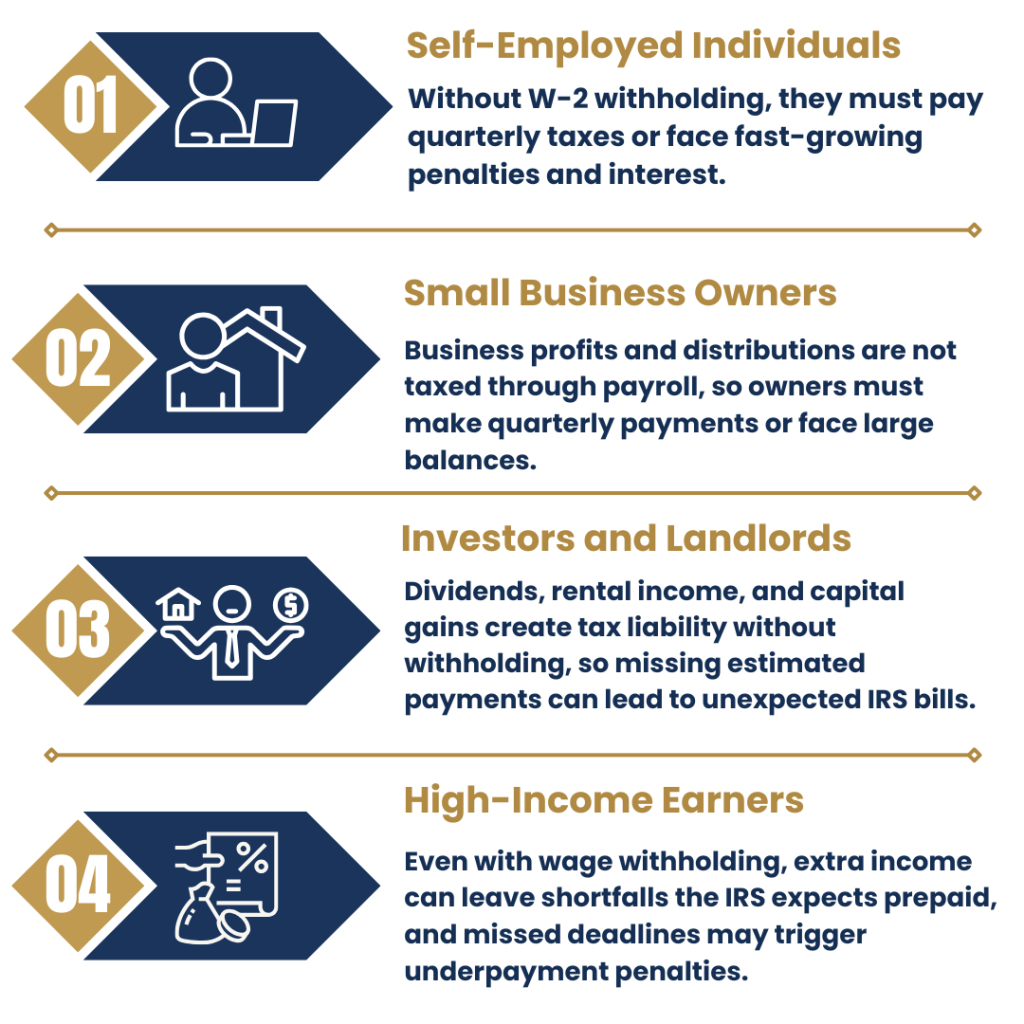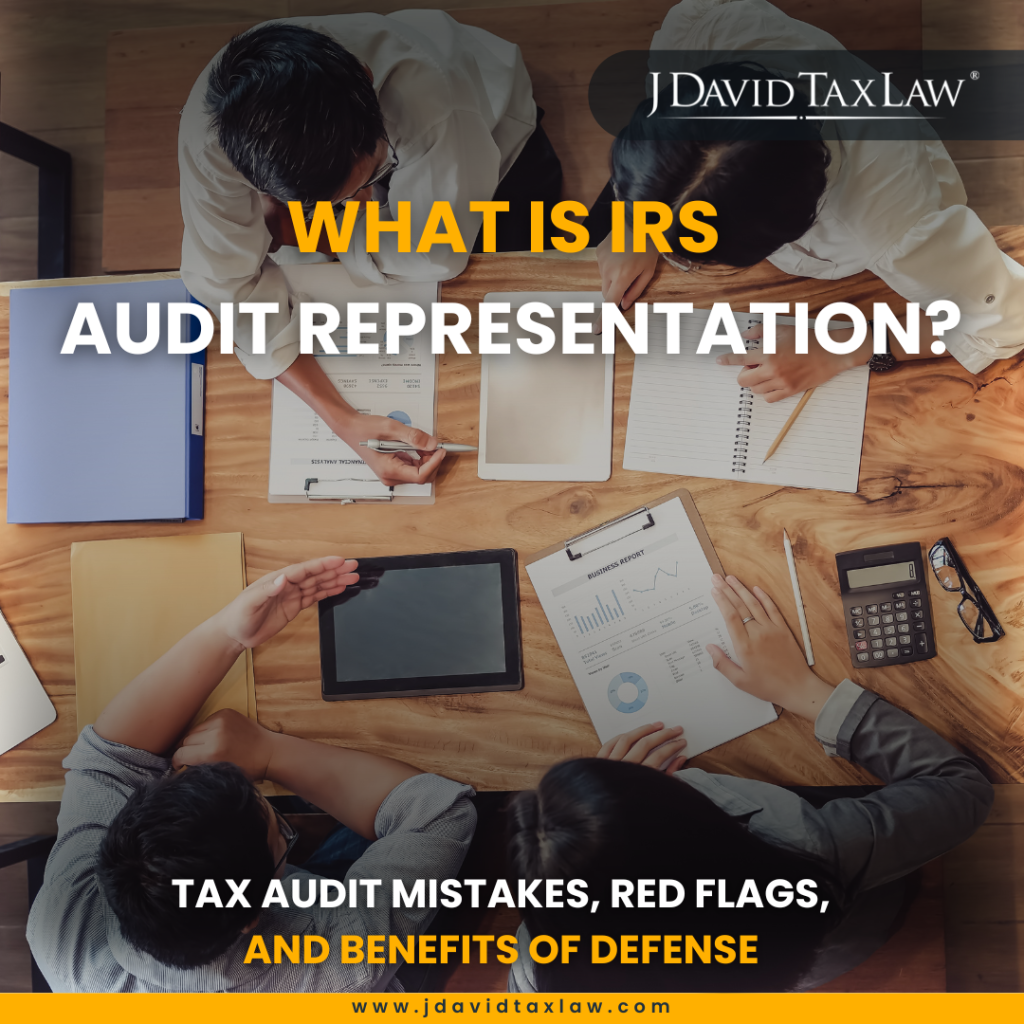September 15, 2025 was the deadline for third quarter estimated tax payments. For self-employed professionals, contractors, small business owners, and investors, this due date is one of the most important markers in the tax calendar.
Missing it may seem like a small oversight, but the IRS treats late or missed federal estimated tax payments seriously. Interest and penalties begin accruing right away, and a single missed payment can snowball into a larger balance that lingers until Tax Day due in April, or beyond.
As tax season 2025 moves toward its close, understanding what happens if you miss the September deadline and how to manage unpaid obligations is critical to avoiding IRS enforcement and escalating debt.
The IRS is Forgiving Millions Each Day. You Could Be Next.
What Are Estimated Tax Payments?
Estimated tax payments are periodic payments made directly to the IRS to cover income tax liability that isn’t automatically withheld throughout the year. Instead of waiting until April to pay the full balance, taxpayers send in these quarterly payments to stay current with their ongoing tax obligations.
They are essentially prepayments of your annual tax bill, divided into four installments. By paying as you earn, you reduce the risk of underpayment penalties, large year-end balances, and interest charges.
Estimated Tax Payment Deadlines for 2025
| Quarter | Period Covered | Payment Due Date |
|---|---|---|
| Q1 | January 1 – March 31 | April 15, 2025 |
| Q2 | April 1 – May 31 | June 16, 2025 |
| Q3 | June 1 – August 31 | September 15, 2025 |
| Q4 | September 1 – December 31 | January 15, 2026 |
Note: If a deadline falls on a weekend or federal holiday, the due date shifts to the next business day.
Who Needs to Make Estimated Tax Payments?
Not every taxpayer is required to send quarterly payments. The IRS expects estimated payments when income isn’t automatically covered by withholding, such as:

What Happens If You Miss an Estimated Tax Payment Deadline?
Penalties Begin Immediately
The IRS imposes an underpayment penalty under IRC §6654 if quarterly payments are missed or insufficient. This penalty applies even if you settle the balance at filing. Penalties are calculated based on how much was underpaid and how long the balance remains outstanding.
Interest Compounds Daily
Beyond penalties, unpaid balances accrue interest under IRC §6601, with rates updated quarterly. Interest is compounded daily, which means even small shortfalls can grow into larger debts quickly. The IRS applies this charge until the full tax liability is resolved.
IRS Notices Follow Quickly
Taxpayers who miss deadlines often receive CP14 or CP501 notices, which are formal demands for payment. These notices outline balances due and warn that penalties and interest are increasing. Ignoring them may escalate the issue into enforcement actions.
Risk of Enforced Collection
If balances remain unpaid, the IRS may enforce collection under IRC §§6321 and 6331. This authority allows the agency to file federal tax liens, garnish wages, or levy bank accounts. Such actions can severely disrupt finances and credit standing.
Growing Year-End Balances
Missing quarterly deadlines doesn’t cancel the obligation — it pushes it forward. According to Publication 505 (Tax Withholding and Estimated Tax), unpaid installments roll into a larger lump sum due by April. This often leaves taxpayers unable to pay in full.
Increased IRS Scrutiny
A pattern of late or missed estimated payments signals noncompliance. The IRS may be less willing to grant penalty relief or installment agreements in these cases. Publication 594 (The IRS Collection Process) details how repeated underpayment can trigger stricter enforcement.
The Safe Harbor Rule: Why Paying “Enough” Isn’t Always Enough
The IRS recognizes that taxpayers can’t always predict income with perfect accuracy, especially if earnings fluctuate. To reduce the risk of penalties, the agency provides a “safe harbor rule” that offers protection when certain payment thresholds are met. However, while this rule can shield you from underpayment penalties, it does not erase your overall tax liability — meaning you could still face a large balance due at filing.
Understanding the Rule
90% or 100% Threshold
To qualify, you must pay at least 90% of your current year’s tax liability or 100% of the prior year’s taxes. This ensures penalty protection but does not remove the obligation to pay the full amount due when filing.
High-Income Exception
For taxpayers with adjusted gross income (AGI) above $150,000 in the prior year, the threshold increases to 110% of last year’s tax liability. This calculation uses AGI shown on Form 1040, Line 11.
Limitations of Protection
Options If You Can’t Pay Your Estimated Taxes
Missing a quarterly deadline or falling behind on payments doesn’t mean you’re out of options. The IRS provides several legal relief programs for taxpayers who cannot afford to pay in full, but navigating these programs is complex. This is where experienced tax attorneys can make a difference by protecting your rights and negotiating directly with the IRS.
Installment Agreements
Under IRC §6159, taxpayers may qualify for installment agreements that allow debt to be paid monthly instead of in one lump sum. These plans can stop collection actions but require compliance with ongoing payments.
Offer in Compromise (OIC)
Authorized under IRC §7122, an Offer in Compromise allows taxpayers to settle their debt for less than the full amount if they can prove inability to pay. The IRS considers income, expenses, and assets before approving this relief option.
Facing a large IRS bill after missing estimated payments? We’ve helped clients reduce $1.2M debt to $60,300 with an Offer in Compromise. Call (888) 342-9436 for a free tax consultation.
Penalty Abatement
Taxpayers may qualify for First-Time Penalty Abatement or abatement for “reasonable cause” under IRC §6651. This relief can reduce or remove penalties, lowering the total debt owed.
Owe penalties and interest? We saved one client over $150,000 by getting penalties and interest waived.
Currently Not Collectible (CNC) Status
If paying would create financial hardship, taxpayers may be placed in CNC status. Under this protection, the IRS temporarily halts collection actions, though penalties and interest still accrue.
How J. David Tax Law Can Help
Missing the September 15 deadline doesn’t have to leave you facing IRS problems alone. With over four decades of collective experience, our tax attorneys focus exclusively on IRS and state tax debt resolution — not tax prep or filing.
J. David Tax Law is an A+ BBB Accredited firm with more than 1,000 nationwide 5-star reviews. We’ve been recognized with honors including the Martindale-Hubbell AV Preeminent award and the Avvo Client’s Choice award. In many cases, we’ve stopped IRS or state wage garnishments in as little as 48 hours.
Contact us today for a free confidential consultation with an experienced tax attorney.
Other Resources You May Find Useful
- All Publication 1040-ES revisions
- IRS Tax Withholding Estimator
- About Publication 505, Tax Withholding and Estimated Tax
- Other current products
Conclusion
Missing the September 15, 2025 estimated tax payment deadline doesn’t mean your situation is hopeless, but delaying action will make it worse. The IRS adds penalties and interest every month, and unpaid balances can quickly snowball into liens, levies, or wage garnishments.
The good news: with the right legal guidance, you can stop IRS collections, reduce what you owe, and get back on track. J. David Tax Law has the experience, awards, and nationwide reputation to help resolve your case.
Frequently Asked Questions
If you miss a deadline, the IRS may assess underpayment penalties under IRC §6654 and charge daily interest on the unpaid amount. Continued nonpayment can trigger IRS notices, liens, levies, or wage garnishments. Legal relief options — like installment agreements, Offers in Compromise, or penalty abatement — may still be available.
The IRS allows payments through IRS Direct Pay, the Electronic Federal Tax Payment System (EFTPS), debit/credit card, or mailed vouchers with Form 1040-ES. Setting calendar reminders for the quarterly due dates — April, June, September, and the following January — can also help you stay on track. If you’ve already fallen behind or can’t afford the payments, an experienced tax attorney can explore relief options like installment agreements or penalty abatements.
Estimated taxes are generally based on your expected income, deductions, and credits for the year. Many taxpayers use Form 1040-ES or IRS online calculators to determine their quarterly amounts. Another method is the safe harbor rule.



















